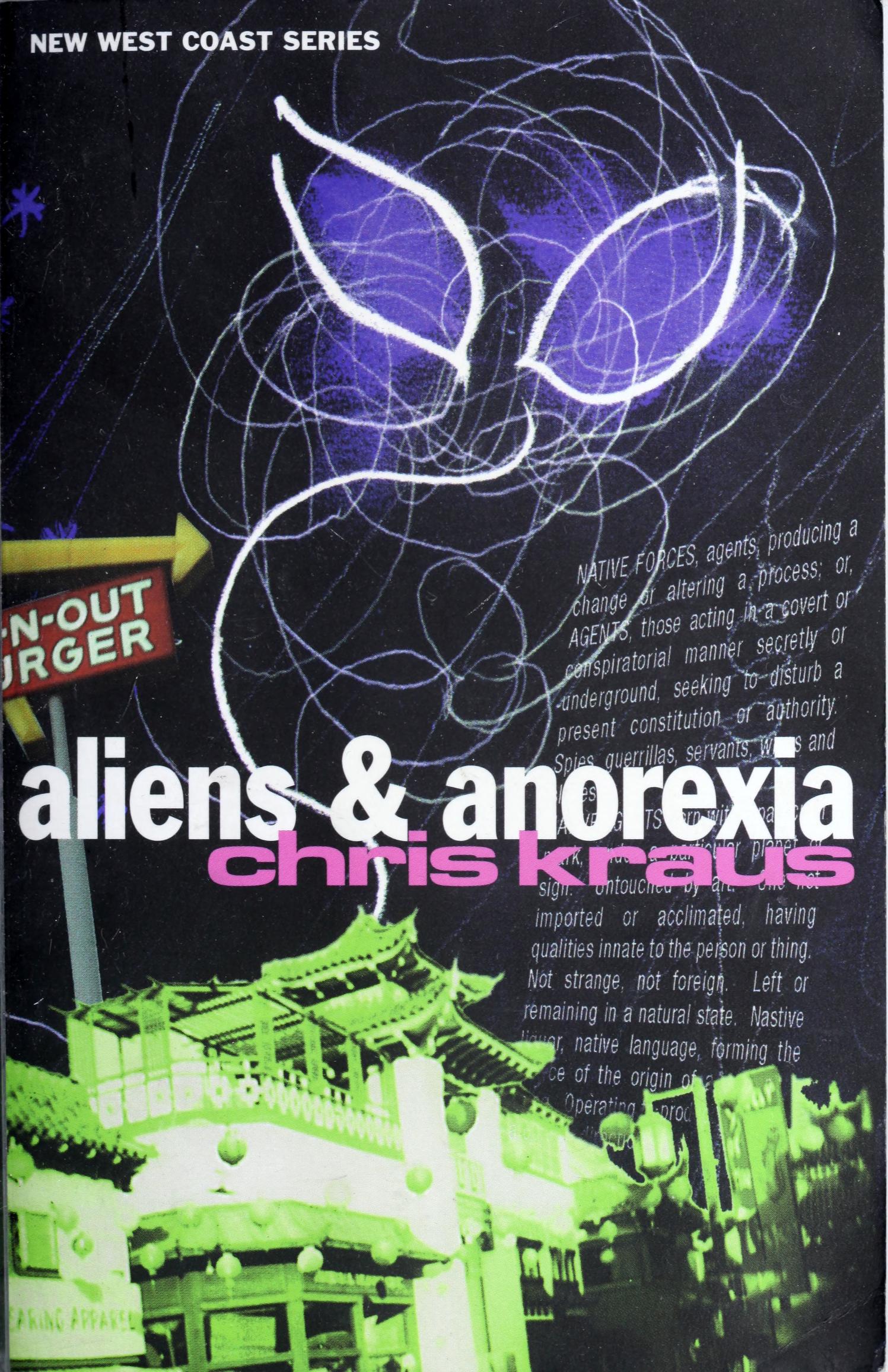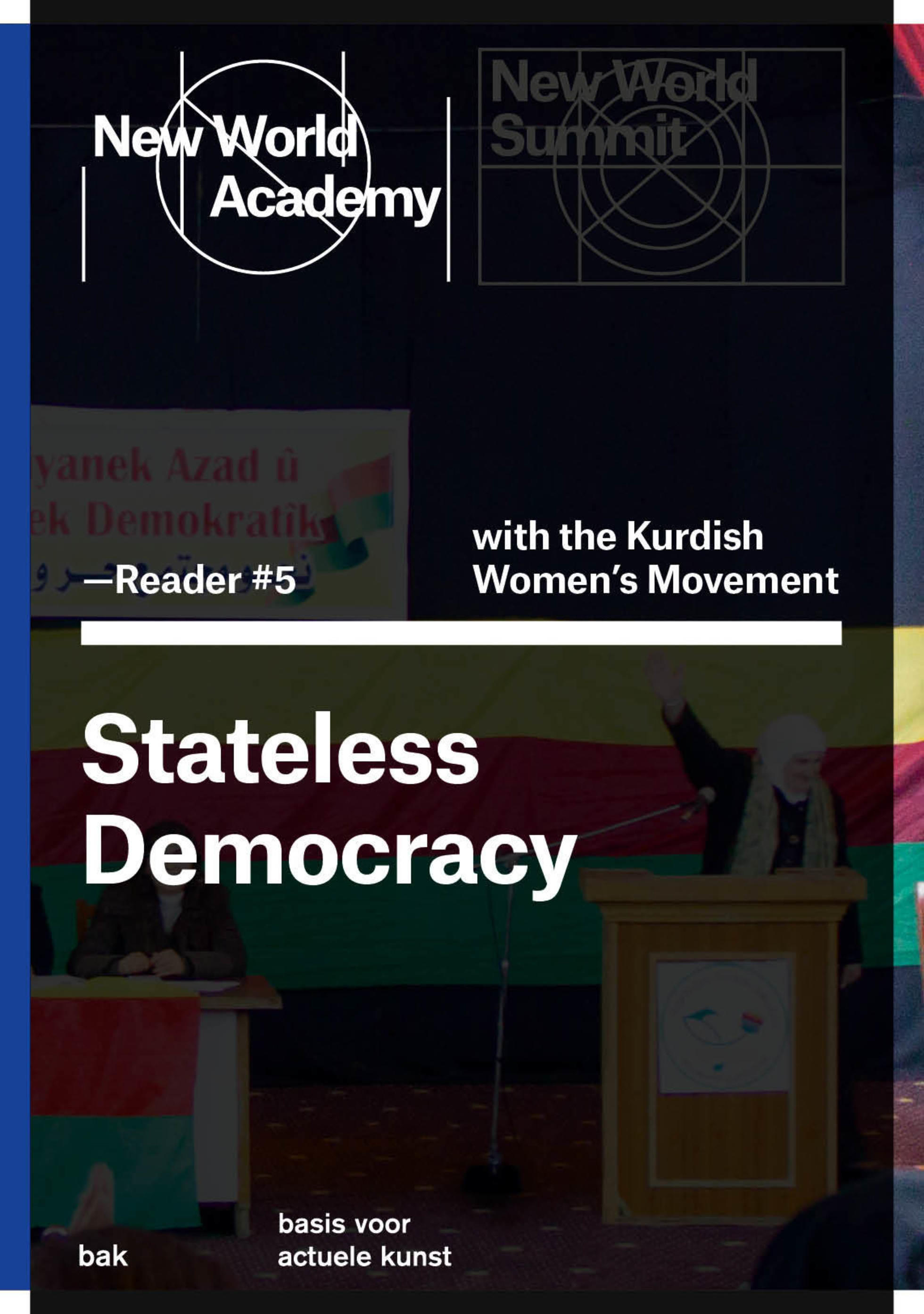Chris Kraus: Aliens & Anorexia (2000)
Filed under fiction | Tags: · art, film, gender, storytelling

“Chris Kraus’s second novel defines a female form of chance that is both emotional and radical. Unfolding like a set of Chinese boxes, with storytelling and philosophy informing each other, the novel weaves together the lives of earnest visionaries and failed artists. Its characters include Simone Weil, the first radical philosopher of sadness; the artist Paul Thek; Kraus herself; and “Africa,” Kraus’s virtual S&M partner, who is shooting a big-budget Hollywood film in Namibia while Kraus holes up in the Northwest woods to chronicle the failure of Gravity & Grace, her own low-budget independent film.
In Aliens & Anorexia, Kraus makes a case for empathy as the ultimate perceptive tool, and reclaims anorexia from the psychoanalytic girl-ghetto of poor “self-esteem.” Anorexia, Kraus writes, could be an attempt to leave the body altogether: a rejection of the cynicism that this culture hands us through its food.”
Publisher Semiotext(e), Brooklyn, NY, 2000
Native Agents series
ISBN 1584350016
236 pages
Interview with author (video, 4 min, 2008)
Introduction to new edition by Palle Yourgrau (Bookforum, 2013)
Review: Giovanna Barbara Alesandro (Ark Books, 2017)
PDF (63 MB, no OCR)
Comment (0)New World Academy Reader, 5: Stateless Democracy (2015)
Filed under book | Tags: · democracy, gender, governance, jineology, kurdistan, politics, revolution, rojava, women

“New World Academy, an alternative learning platform for art and politics established by artist Jonas Staal and BAK has entered its fifth sequence. Developed together with the Kurdish Women’s Movement as a nomadic platform that unfolding throughout 2015, the fifth sequence of the New World Academy explores—from artistic, activist, and scholarly perspectives—the proposition of delinking democracy from the nation-state: the notion of “stateless democracy.” On this occasion, the fifth reader of the New World Academy, titled Stateless Democracy, has been published.
If initially the Kurdish struggle, led by the Kurdistan Workers’ Party (PKK), had aimed to establish an independent state, since the 1990s PKK leader Abdullah Öcalan, together with the Kurdish Women’s Movement, have turned to questioning the patriarchal and capitalist nature of the very concept of the nation-state itself. Within this process the Kurdish revolutionary movement developed an alternative model called “democratic confederalism” or “stateless democracy” that invoked a confederate composition in which gender-equality, self-governance, secularism, cultural diversity, communal economy, and social ecology form key pillars.
Since 2012 this proposition has been put fully into practice in Rojava, Western Kurdistan in Syria, in alliance with the peoples of the region. New World Academy Reader #5: Stateless Democracy provides key texts that offer an overview of both the political and cultural dimensions comprising what has now come to be known to history as the Rojava Revolution. The texts in the reader are as much an introduction to the model of stateless democracy practiced in Rojava, as a potential political paradigm through which to confront the many related crises in politics, economy, and ecology that we face across the world.”
With contributions by: Kajal Ahmed (poet and journalist), Ahmet Hamdi Akkaya (political and social scientist), Janet Biehl (writer, editor, and graphic artist), Murray Bookchin (libertarian socialist author), Dilar Dirik (researcher and representative of the Kurdish Women’s Movement), Zîlan Diyar (Kurdish guerrilla fighter), David Graeber (anthropologist), Havin Güneşer (journalist and spokesperson of “Freedom for Abdullah Öcalan – Peace in Kurdistan”),Joost Jongerden (sociologist and anthropologist), Gönül Kaya (journalist and representative of the Kurdish Women’s Movement), Abdullah Öcalan (founder and leader of the Kurdistan Workers’ Party (PKK)), Pinar Öğünç (journalist), Jonas Staal (artist and writer), and Hito Steyerl (artist, documentary filmmaker, and writer).
Edited by Renée In der Maur and Jonas Staal in dialogue with the Kurdish Women’s Movement (and in particular Dilar Dirik, Kurdish activist and a PhD student at the University of Cambridge, Cambridge)
Publisher BAK, basis voor actuele kunst, Utrecht, 2015
ISBN 9789077288221
256 pages
Out of print, now open access
Lucie Vágnerová: Sirens/Cyborgs: Sound Technologies and the Musical Body (2016)
Filed under thesis | Tags: · body, cyborg, electronic music, feminism, gender, music, sound art, technology, women
“This dissertation investigates the political stakes of women’s work with sound technologies engaging the body since the 1970s by drawing on frameworks and methodologies from music history, sound studies, feminist theory, performance studies, critical theory, and the history of technology. Although the body has been one of the principal subjects of new musicology since the early 1990s, its role in electronic music is still frequently shortchanged. I argue that the way we hear electro-bodily music has been shaped by extra-musical, often male-controlled contexts. I offer a critique of the gendered and racialized foundations of terminology such as “extended,” “non-human,” and “dis/embodied,” which follows these repertories. In the work of American composers Joan La Barbara, Laurie Anderson, Wendy Carlos, Laetitia Sonami, and Pamela Z, I trace performative interventions in technoscientific paradigms of the late twentieth century.
The voice is perceived as the locus of the musical body and has long been feminized in musical discourse. The first three chapters explore how this discourse is challenged by compositions featuring the processed, broadcast, and synthesized voices of women. I focus on how these works stretch the limits of traditional vocal epistemology and, in turn, engage the bodies of listeners. In the final chapter on musical performance with gesture control, I question the characterization of hand/arm gesture as a “natural” musical interface and return to the voice, now sampled and mapped onto movement. Drawing on Cyborg feminist frameworks which privilege hybridity and multiplicity, I show that the above composers audit the dominant technoscientific imaginary by constructing musical bodies that are never essentially manifested nor completely erased.”
PhD Dissertation
Publisher Graduate School of Arts and Sciences, Columbia University, 2016
Advisor: Ellie M. Hisama
242 pages

